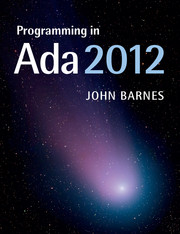Summary
This is the first of three chapters covering in outline the main goals, concepts and features of Ada. Enough material is given in these chapters to enable the reader to write significant programs. It also allows the reader to create a framework in which the exercises and other fragments of program can be executed, if desired, before all the required topics are discussed in depth.
The material covered in this chapter corresponds approximately to that in simple languages such as Pascal and C.
Key goals
Ada is a large language since it addresses many important issues relevant to the programming of practical systems in the real world. It is much larger than Pascal which is really only suitable for training purposes and for small personal programs. Ada is similarly much larger than C although perhaps of the same order of size as C++. But a big difference is the stress which Ada places on integrity and readability. Some of the key issues in Ada are
• Readability – professional programs are read much more often than they are written. So it is important to avoid a cryptic notation such as in APL which, although allowing a program to be written down quickly, makes it almost impossible to be read except perhaps by the original author soon after it was written.
• Strong typing – this ensures that each object has a clearly defined set of values and prevents confusion between logically distinct concepts. As a consequence many errors are detected by the compiler which in other languages (such as C) can lead to an executable but incorrect program.
• Programming in the large – mechanisms for encapsulation, separate compilation and library management are necessary for the writing of portable and maintainable programs of any size.
• Exception handling – it is a fact of life that programs of consequence are rarely perfect. It is necessary to provide a means whereby a program can be constructed in a layered and partitioned way so that the consequences of unusual events in one part can be contained.
• Data abstraction – extra portability and maintainability can be obtained if the details of the representation of data are kept separate from the specifications of the logical operations on the data.
• Object oriented programming – in order to promote the reuse of tested code, the type flexibility associated with OOP is important.
- Type
- Chapter
- Information
- Programming in Ada 2012 , pp. 11 - 26Publisher: Cambridge University PressPrint publication year: 2014

